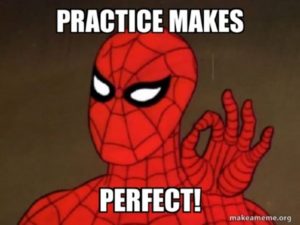Are you struggling with a task? Remember, 'practice makes perfect.' This post unpacks the meaning and origin of this expression.
Meaning
The expression 'practice makes perfect' means that achieving perfection in anything takes time and practice. 'Practice makes perfect' refers to completing the same actions over and over again until they become hardwired in your mind and physiology. The only way to achieve success with anything is to repeat it again and again.
Practice makes perfect refers to sports, work activities, and all actions required to build a skillset in life. Practicing helps you build motor skills and neurological pathways. You can refine these pathways to perfection, provided you put in the time to practice these skills.
Example Usage
"Look, son. I know you want to give up, but practice makes perfect. If you spend some time practicing your swing every day, eventually, you'll get better at it."
"Didn't anyone ever tell you practice makes perfect? You can't expect to get it right on the first day. It's going to take a while to get it right."
"Practice makes perfect, so get out there. The more time you spend on it, the better you get. That's how it works for everyone, and you're no different."
"I suppose practice makes perfect. I'll have to spend a few hours with the CRM to understand how it works and get my workflows right."
"They say practice makes perfect. But if nobody's perfect, then why practice at all? It doesn't make sense to me, but I guess I'll give it a try."
"I'm heading to the courts for a few hours. Practice makes perfect, and I have a long way to go to make the first string."
"I can't seem to get my cast right. My dad says practice makes perfect, and I need to keep at it if I want to be a good fisherman."
"If you want to be the best, you need to put in the time. Practice makes perfect. There's no way you can take shortcuts to build a skillset."
"To be the best, you need to train harder than the rest. Practice makes perfect. With the right attitude, you'll make it to the Olympics."


Origin
The expression' practice makes perfect' originates from the mid-1500s. It's originally an Anglo-American phrase adopted from Latin 'Uses promptos facit.'
The first iteration of the phrase in writing is in "Diary and Autobiography of John Adams," written by Gregory Titelman and published in 1761, where it appears as follows.
"The more you practice, the better your skills are."
Language experts cannot pinpoint the phrase's first use in the English lexicon in its modern format. There is no information on who coined the contemporary version of the expression.
Phrases Similar to Practice Makes Perfect
- Repetition builds perfection.
- The more I practice, the luckier I get.
Phrases Opposite to Practice Makes Perfect
- Why bother.
- No point in trying.
What is the Correct Saying?
- Practice makes perfect.
Ways People May Say Practice Makes Perfect Incorrectly
The expression' practice makes perfect' doesn't imply that you can achieve perfection, as that's impossible with anything. It motivates the other person or yourself into trying harder.
Acceptable Ways to Phrase Practice Makes Perfect
You can use the expression' practice makes perfect' as a motivating statement to yourself or others. By saying 'practice makes perfect,' you're implying you need to practice if you want to improve. The phrase suits social and professional use. You could use it at work to describe how employees need to spend more time on the CRM to perfect its use in the workplace.
You could use it with your kids to motivate them to practice harder in a given sport. The phrase suits verbal exchanges and text-based communications. 'Practice makes perfect' can refer to any action that requires time and effort to build a skill. You could use it to describe work, sports, cooking, video games, and many other lifestyle tasks.